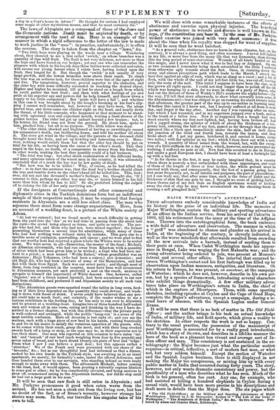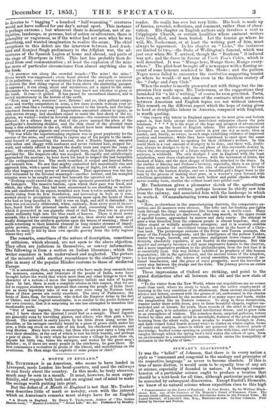MAJOR WORTHINGTON'S ADVENTURES. * THESE adventures embody considerable knowledge of India
and its history in the guise of an individual life. The memoirs of Major Worthington contain the military, and sporting adventures of an officer in the Indian service, from his arrival at Calcutta in 1803, till his retirement from the army at the time of the Afghan war. Thrown into the autobiographical form, the book embraces a wide field of adventure and observation. The manner in which a "gruff" was abandoned to chance and plunder on his arrival in India, at the beginning of the century, is cleverly indicated, as well as the worse mischiefs that afterwards resulted from crowding all the new arrivals into a barrack, instead of sending them to their posts at once. When Cadet Worthington made his appear- anoe in Bengal, Lake was waging the first Mahratta war ; and the young adventurer being ordered to join, was present at Monson's retreat and several other affairs. The interval that occurred be- tween Worthington's outset and his first furlough was filled up by observation upon Indian manners, antiquities, and literature. On his return to Europe, he was present, en amateur, at the campaign of Waterloo; which he does not, however, describe in his own per- son, but by a species of framework, introducing several characters who exhibit things dramatically. A few other military adven- tures take place on Worthington's return to India, the chief of which is the capture of Bhurtpore. These, with some sporting sketches, including episodes at Ceylon and the Cape of Good Hope, complete the Mayor's adventures, except a campaign, during a se- cond leave of absence, with the Spanish Legion under General Evans.
. It will be seen that there is no lack of matter in The Old Field- Officer ; and the author brings to his task an actual knowledge of India, of military life, and field-sports, which gives a reality to the sketches. In other respects the work is not so happy. Cen- tury to the usual practice, the possession of the manuscript of poor Worthington is accounted for by a really good introduction, which has a story of its own, and describes in a lifelike manner the hero of the book as a pleasant bon vivant and average sort of In- dian officer and man. This consistency is not -sustained in the au- tobiography: the Major becomes just what the particular section requires—is critical, reflective, a sort of modern fast man or what not, but very seldom himself. Except the section of man, and the Spanish Legion business, there is skill displayed in not making the Major too conspicuous, or mixing him up with every public matter in India that occurred during forty years. The story, however, not only wants dramatic consistency and power, but the specificality of a man who describes what he has seen. Much of the book is too general, often too curt Any one, for example, who had assisted at killing a hundred elephants in Ceylon during a casual visit, would have been more precise in his descriptions and dealt more in details than the Major does. The six pages which
• The Old Field-Officer,• or the Military and Sporting Adventures of Major Worthington. Edited by J. H. Stoe9ueler, Author of "The Life of the Duke of Wellington," "The Handbook of Entish India," Ste. 8sc. In two volumes. Pub- lished by Adam and Charles Black, Edinburgh, he devotes to " bag " a hundred " half-reasoning " creatures would not have sufficed for one day's actual sport. This instance is perhaps extreme ; but wherever there is description, not of an- tiquities, landscape, or persons, but of action or adventure, there is generality or vagueness, as if the writer had not seen what he was &scribing, and wanted imagination to realize the scene. The chief exceptions to this defect are the interview between Lord Auck- land and Runjeet Singh preliminary to the Affghan war, the ad- ventures of the Spanish Legion at home and abroad, and parts of the siege of Bhtirtpore in 1825. This last has probably been de- rived from oral communication ; at least the explosion of the mine has more of particular circumstance than almost anything else in the book.
"A murmur ran along the crowded trench—' The mine ! the mine !' Every breath was suppressed; every heart altered the strength or interval of its pulsations; every ear was strained to the utmost ,- and every eye strove to discern the first rising vapour of the train above the sheltering parapet. It appeared ; it ran along, silent and mysterious, yet a signal to the many thousands who watched it, calling them they knew not whether to glory or the tomb. It rose—it glided. It has passed its unconfined channel, and is buried mysteriously in the bowels of the earth.
"Now, men ! now, warriors ! now, Britons ! and ye, their gallant compa- nions and worthy competitors in arms, a few more seconds restrain your ar- dour, and then like a rushing mountain torrent to the breach, and the long- renowned fortress is your own ! Expectation amounted almost to agony, as with nerves strung, and shoulders raised to resist the first shock of the ex- plosion, we waited—waited in feverish suspense—the summons that was still elayed ; for a silence deep as that of the grave usurped the place of the earthquake's desolating shudder, and the thin cloud of the arrested train hung a dim exhalation in the air, which should have been darkened by the fragments of yonder gigantic and overawing bastion. 'It was while the superintending engineer was in great perplexity for the success of the mine, and unwilling to expose any of his people to the immi- nent hazard of approaching the saucisse, that a Hindoo faqueer, smeared *ith ashes and shaggy with sunburnt and never violated hair, stepped for- ward, and calmly offered to inspect the deadly train and report the cause of delay. He craved, in guerdon, but a slight boon, that his family should be provided for. His desperate offer was accepted. He rapidly and unfalteringly approached the saucisse; he bent down his head to inspect the last footprints of the extinguished fire. The earth trembled, it rocked and heaved before and beneath him. He saw that mighty embattled hill majestically rise and approach him, with a speed that baffled all hope of flight, yet with a Belem- mty that beggars every power of description. That appearance was the last ever witnessed by the devoted messenger—another instant, and his mangled remains were to be sought several feet beneath the uprooted soil.
"Nothing could exceed the majesty of the spectacle presented to the eyes of the besiegers. The massive bastion upon which thew gaze was fixed, and which, day after day, they had been accustomed to see standing so motion- less and unaltered in its aspect, trembled now from level to summit, and gra- dually rising from its firm foundation, and increasing in bulk as it rose, seemed about to precipitate its overwhelming moss upon the heads of those who had so long insulted it. Still it rose on high, and still it distended ; its form was yet scarcely obliterated, when, suddenly, from every pore of its sur- face, burst forth the prisoned smoke and dust, concealing the ruin from which it proceeded in one gigantic cloud of dull hue, that rose in graceful silent sublimity high into the blue vault of heaven. There it stood many seconds, like a tower connecting earthand sky, then slowly and most gra- dually dissipated the aEriform particles upon the breeze of morning ; those of earth returning to their kindred element in long slender streams of impal- pable powder, presenting the effect of the most graceful cataract, could clouds be made to fall by their own specific gravity from the lofty regions where they roll."
The remarks, sometimes of the nature of description, sometimes of criticism,, which abound, are not open to the above objection. They often are judicious in themselves, or convey information. The following is from a section on Indian literature; which the writer considers is both undervalued and neglected. The picture of the minstrel adds another resemblance to the similarity trace- able in many of the popular Hindoo customs to those of mediteval Europe.
"It is astonishing that, among so many who have made deep research into the manners, customs, and literature of the people of India, none have brought before the world that which more than any other brings to view the character of a nation—I mean the legendary ballads and tales of bygone days. In fact, there is such a complete silence in this respect, that we are led to suppose students were ignorant that among the people of India there are as many legendary tales of war as ever were sung by Norman bard. Some of these poems are really excellent. The story of l'admunee, the bride of Rana Sing for instance who defied the Emperor Acbar in the fort of Chitar, and the tragical catastrophe, is so similar to the poetic fictions of our own country, that it is surprising no one has attempted to translate this inestimable poem. "Out of many legends, (the manuscriptsof which are in my posses- sion,) I have chosen the shortest I could find as a sample. These legends are generally sung by travelling gipeies, and others, who thus gain a live- lihood. The minstrel is easily known by his little drum slung across his shoulder, or his saringee carefully bound in a piece of green cloth under his arm, a little cap stuck on one side of his head, his checkered mirjaee, and long dhottee. Many have swords; but those who are poor carry a long stick over their shoulder, at the end of which is tied his little bundle, and perhaps a pair of shoes. It is only when he arrives near a village he puts these on, adjusts his little cap, tunes his saringee, and makes for the great man's habalee ; or, if there are many people in the cutcherry, he goes there. He first commences a recitation in praise of the liberal, and maledictions on the avaricious. He then sings the exploits of some prince or chief."



































 Previous page
Previous page